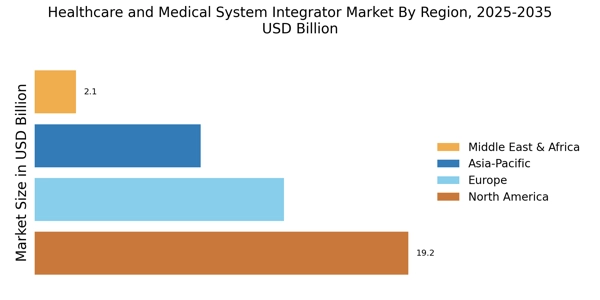Regulatory Compliance and Standards
Regulatory compliance is a critical driver in the Healthcare and Medical System Integrator Market. Healthcare organizations are mandated to adhere to various regulations, such as HIPAA and HITECH, which govern the secure handling of patient information. As these regulations evolve, the need for integrators who can ensure compliance through effective system integration becomes increasingly vital. The market is witnessing a shift towards solutions that not only meet regulatory requirements but also enhance data security and patient privacy. This focus on compliance is expected to drive the demand for specialized integration services, as organizations seek to mitigate risks associated with non-compliance.
Increased Focus on Patient-Centric Care
The shift towards patient-centric care is reshaping the Healthcare and Medical System Integrator Market. Healthcare providers are increasingly prioritizing patient engagement and satisfaction, which necessitates the integration of various systems to provide a holistic view of patient data. This trend is evident in the growing implementation of patient portals and mobile applications that allow patients to access their health information. As healthcare organizations strive to enhance the patient experience, the demand for integrators who can facilitate the seamless exchange of information across platforms is likely to increase. This focus on patient-centric solutions is expected to drive innovation and growth within the market.
Advancements in Health Information Technology
Technological advancements in health information technology are significantly influencing the Healthcare and Medical System Integrator Market. Innovations such as electronic health records (EHRs), telemedicine, and mobile health applications are reshaping the landscape of healthcare delivery. These technologies require robust integration solutions to ensure that data flows seamlessly across platforms. The increasing adoption of EHRs, which is expected to reach over 90% among healthcare providers by 2025, underscores the necessity for effective system integration. As healthcare organizations invest in these technologies, the demand for integrators who can provide comprehensive solutions is likely to rise, further propelling market growth.
Rising Investment in Healthcare Infrastructure
Investment in healthcare infrastructure is a significant driver of the Healthcare and Medical System Integrator Market. Governments and private entities are increasingly allocating resources to modernize healthcare facilities and implement advanced technologies. This investment is often accompanied by a need for system integration to ensure that new technologies work harmoniously with existing systems. The market is projected to benefit from this trend, as healthcare organizations seek integrators who can provide tailored solutions that address their unique challenges. As infrastructure development continues, the demand for effective integration services is likely to grow, further enhancing the market landscape.
Growing Need for Integrated Healthcare Solutions
The Healthcare and Medical System Integrator Market is experiencing a notable surge in demand for integrated healthcare solutions. This trend is driven by the increasing complexity of healthcare systems, which necessitates seamless communication between various medical devices and software applications. As healthcare providers strive to enhance patient outcomes and operational efficiency, the integration of disparate systems becomes paramount. According to recent data, the market for healthcare integration solutions is projected to grow at a compound annual growth rate of approximately 12% over the next five years. This growth reflects the industry's recognition of the importance of cohesive systems that facilitate data sharing and improve clinical workflows.

















